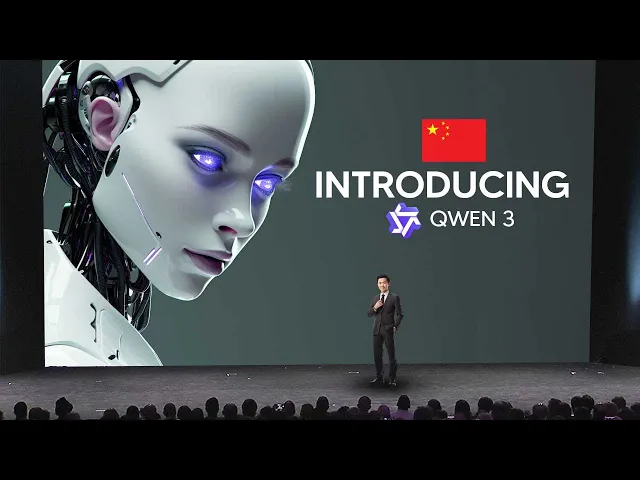This New OpenSource AI Crushes Everything…(Qwen 3) Beats DeepSeek…

Qwen 3 crushes the competition with free AI
Alibaba Cloud has just unleashed Qwen 3, a collection of open-weight models that might just redefine what we expect from freely available AI. After spending time testing these models firsthand, I'm convinced we're witnessing a significant leap forward that rivals (and in some ways exceeds) what we've seen from DeepSeek, Claude, and even some of OpenAI's offerings.
Key Points
- Qwen 3's flagship 235B parameter model outperforms DeepSeek and matches or exceeds top commercial models on major benchmarks
- The platform offers an impressive suite of integrated capabilities including image and video generation, voice chat, and web search – all available for free
- Unique "thinking mode" allows the AI to reason through complex problems, improving accuracy and demonstrating deeper reasoning capabilities than many competitors
The Most Important Innovation: Accessible AI Sophistication
What strikes me most about Qwen 3 isn't just its raw performance, but how it democratizes access to sophisticated AI capabilities. While companies like Anthropic and OpenAI continue to gate their most powerful features behind paywalls and rate limits, Alibaba has packaged a comprehensive suite of AI tools – from dynamic thinking to multimodal generation – in a freely accessible package.
This matters because we're at a crucial inflection point in AI adoption. As businesses increasingly integrate AI into their workflows, the availability of powerful, unrestricted models creates a more level playing field. Small teams and individual developers no longer need enterprise-level budgets to access cutting-edge AI capabilities, potentially accelerating innovation across sectors.
What Sets Qwen 3 Apart
1. Beyond-the-benchmark performance
While benchmark scores are impressive (outperforming models like GPT-4o on several tests), what's more telling is real-world performance. I tested Qwen 3 against Claude 3.7 Sonic on several tasks including HTML generation, visual design, and simulation creation. While Claude edged out in some areas, Qwen 3's performance was remarkably competitive – especially considering its accessibility.
The code generation capabilities deserve special attention. In my testing, Qwen 3 successfully created interactive simulations, data visualizations,
Recent Videos
How To Earn MONEY With Images (No Bullsh*t)
Smart earnings from your image collection In today's digital economy, passive income streams have become increasingly accessible to creators with various skill sets. A recent YouTube video cuts through the hype to explore legitimate ways photographers, designers, and even casual smartphone users can monetize their image collections. The strategies outlined don't rely on unrealistic promises or complicated schemes—instead, they focus on established marketplaces with proven revenue potential for image creators. Key Points Stock photography platforms like Shutterstock, Adobe Stock, and Getty Images remain viable income sources when you understand their specific requirements and optimize your submissions accordingly. Specialized marketplaces focusing...
Oct 3, 2025New SHAPE SHIFTING AI Robot Is Freaking People Out
Liquid robots will change everything In the quiet labs of Carnegie Mellon University, scientists have created something that feels plucked from science fiction—a magnetic slime robot that can transform between liquid and solid states, slipping through tight spaces before reassembling on the other side. This technology, showcased in a recent YouTube video, represents a significant leap beyond traditional robotics into a realm where machines mimic not just animal movements, but their fundamental physical properties. While the internet might be buzzing with dystopian concerns about "shape-shifting terminators," the reality offers far more promising applications that could revolutionize medicine, rescue operations, and...
Oct 3, 2025How To Do Homeless AI Tiktok Trend (Tiktok Homeless AI Tutorial)
AI homeless trend raises ethical concerns In an era where social media trends evolve faster than we can comprehend them, TikTok's "homeless AI" trend has sparked both creative engagement and serious ethical questions. The trend, which involves using AI to transform ordinary photos into images depicting homelessness, has rapidly gained traction across the platform, with creators eagerly jumping on board to showcase their digital transformations. While the technical process is relatively straightforward, the implications of digitally "becoming homeless" for entertainment deserve careful consideration. The video tutorial provides a step-by-step guide on creating these AI-generated images, explaining how users can transform...
